A Farewell to Shapiro (Page 2)
CAMPUS BUILDING BOOM
|
|
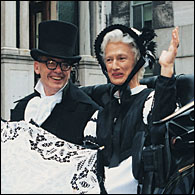 With Chancellor
Emerita Gretta Chambers, BA'47, DLitt'01, in costume for McGill's 175th
Anniversary celebrations. With Chancellor
Emerita Gretta Chambers, BA'47, DLitt'01, in costume for McGill's 175th
Anniversary celebrations.
|
|
|
|
Some infrastructure requirements are being addressed by the building boom on campus -- the biggest reconstruction of the downtown campus since the 1960s. Under Shapiro's watch, McGill has seen the construction of a new law library, a new student services building, and the M.H. Wong Building for engineering. Construction on the Lorne M. Trottier Building for information technology is in full swing and the Montreal Genomics and Proteomics Centre is near completion. And plans are in place for the Francesco Bellini Life Sciences Building and new buildings for the faculties of Music and Arts.
 The new principal
tries out founder James McGill's desk. The new principal
tries out founder James McGill's desk.
|
|
|
|
|
With a campus as historic as McGill's, there are bound to be some upkeep issues as well. Shapiro supported the Campus Renewal Fund, funneling $10 million from the operating budget towards repairs that had fallen into the netherworld of "deferred maintenance" and taking out loans to fund a host of renovation projects. Campus development of a different sort came in the form of a school bus that travels the 20 miles from the downtown to the West Island campus several times a day. According to Dean Buszard, "Bernard brought the Macdonald Campus closer to the rest of McGill than ever before by supporting the inter-campus shuttle bus -- truly a wonderful initiative. It's revolutionized students' academic program choices, making it possible to study on both campuses."
THE QUEBEC IMBROGLIO
Perhaps Shapiro's most significant accomplishment is in situating McGill both provincially and internationally, clarifying McGill's place in the Quebec community while at the same time building on its worldwide reputation. Indeed, McGill's unique role in Quebec is its international reach and stature -- nearly a quarter of McGill students come from outside Canada and the University competes on the world stage with leading research-intensive schools. For Shapiro, if McGill were just another Quebec university, it would be superfluous. His work has helped break down old barriers and prejudices.
|
|
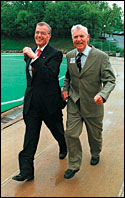 With Dr. Richard
Tomlinson, PhD'48, DSc'01, after Tomlinson's gift of $64 million to
McGill. With Dr. Richard
Tomlinson, PhD'48, DSc'01, after Tomlinson's gift of $64 million to
McGill.PHOTO: Courtesy Montreal Gazette |
|
|
|
Says Dean of Arts Carman Miller: "Over the last decade, the University has come to be seen as a vital Montreal institution, rather than as the bastion of English privilege. When people [in Montreal] hear good news about McGill, it's now regarded as something that is good news for the whole city. That change is largely due to the efforts of the Principal. Bernard made immense contributions on that front."
McGill's thorny relationship with the Quebec government, while still no honeymoon, has certainly become more civil. "Bernard maintained academic standards in the face of manifestly insufficient funding from the provincial government," says Dick Pound, "and lobbied the government at the best level we have enjoyed for decades." Shapiro made sure that McGill's voice was heard, and that its reputation as that "bastion of English privilege" was dosed with the reality that about 20% of the student body overall come from a francophone background, with faculties like Law and Agricultural and Environmental Sciences in particular having a large population of French students from Quebec.
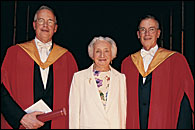 Shapiro (right)
with twin brother Harold, BCom'56, LLD'88, and their mother, Mary
Kantor. Shapiro (right)
with twin brother Harold, BCom'56, LLD'88, and their mother, Mary
Kantor.PHOTO: The Atom Photography Agency |
|
|
|
|
This improved rapport with provincial powers has nonetheless landed Shapiro in hot water on occasion. He enraged a number of alumni in 1998 when as head of CREPUQ he accompanied then Quebec premier Lucien Bouchard on a trade mission to the United States. How dare he associate with a separatist, some wrote, suggesting that to do so was traitorous to the English minority in Quebec. Shapiro knew the trip was controversial but made no apologies and still doesn't, stating plainly that it was in the best interests of the University for him to go and the close access to the premier and top Quebec business leaders proved invaluable.
JUST FOR LAUGHS
|
|
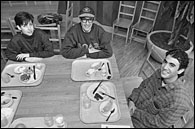 Shapiro as Student
for a Day with undergrads Nora Pyesmany and David Lederman. Lederman
later spent a day as McGill principal. Shapiro as Student
for a Day with undergrads Nora Pyesmany and David Lederman. Lederman
later spent a day as McGill principal.PHOTO: Jonas Papaurelis |
|
|
|
Not all was serious and high-minded during his tenure. He was perfectly capable of self-deprecation, and was willing to bear relative indignities in the spirit of fun from the student press (who loved the fact that he used to manage the famous Ruby Foo's Chinese restaurant), requests for gazpacho recipes from previous McGill News editorial staff, and endless goofy items featuring him and his twin brother Harold, a former university president at Princeton. Even when speaking seriously on matters of academic policy and governance, Shapiro would often lace his pronouncements with mischievous, dry wit, and the private Bernard is recalled with affection.
"What I will remember most fondly about Bernard Shapiro is his humour," says Victoria Lees. "People who do not know him think he is serious, even dour or severe. Actually, he is very, very funny. When I first began to work with him, I thought of saving some of his really hilarious e-mails, but I never did, and now I regret that. One day, walking back from a search committee for a dean or vice-principal or such, he said to me, 'You know how I approach these things? I say to myself, If that person took the job, would I have to kill myself?' I have never interviewed anyone since then without remembering that line and laughing."
THE FUTURE
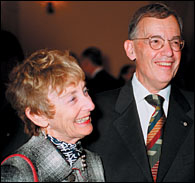 The Principal with
wife Phyllis, a professor in McGill's Faculty of Education and the "best
teacher he's ever seen." The Principal with
wife Phyllis, a professor in McGill's Faculty of Education and the "best
teacher he's ever seen."PHOTO: Claudio Calligaris |
|
|
|
|
The final years of his tenure have seen Shapiro welcoming some financial relief for McGill, with great success on the fundraising front reflected in the record-breaking donation of $64 million made by Dr. Richard Tomlinson, PhD'48, and major donations from Lorne Trottier, Francesco Bellini and others for the new buildings in various stages of development downtown. There has also been some relief from the government, though the battle for funding between education and health care looms large down the road.
Shapiro will be moving on to other ventures. He heads the search for a new conductor for the Montreal Symphony Orchestra, will chair the Board of Directors of Canadian Bureau of International Education, and will sit on a number of other executive bodies. He has also just taken on a task that reunites him with his old trade mission buddy, former Quebec premier Lucien Bouchard. The two were named co-chairs of the Société du Havre de Montréal, an agency that will oversee a huge redevelopment of Montreal's harbourfront.
While it will be fascinating to watch him at work on such a large-scale urban project, one hopes still to hear him speak on the subject of higher education, unfettered by the discretion required of his office.
There is already some hint of that. In that final address to the Students' Society, Shapiro let loose the following torpedo: "I am not satisfied with the students crossing the stage at convocation," arguing that undergraduate education is not providing students with the appropriate broad-based learning and the reasoning and writing skills to communicate effectively. He worries that the "cult of market value" and the "cult of relevance" are compromising higher education everywhere, and that a university education should produce good citizens and not be beholden to the particular corporate trend of the day or utilitarian government demands du jour.
|
|
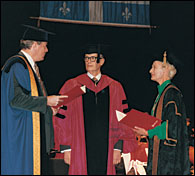 The principal at
his installation ceremony in 1994. The principal at
his installation ceremony in 1994.
|
|
|
|
The point of a university is not to produce goods for society's use, says Shapiro. "The point of a university is creating a changed human being, intellectually and morally autonomous."
Bernard Shapiro has certainly changed McGill. Dick Pound put it this way at the recent colloquium held in Shapiro's honour: "His application of intelligence, wisdom, insight and humour to the many problems facing universities of our era, particularly in the difficult situation we face in Quebec, has helped lead McGill to even greater academic heights. He has guided a great university through troubled times and has provided a base from which it will continue to develop in the years ahead. All of us owe him an immense debt of gratitude."


